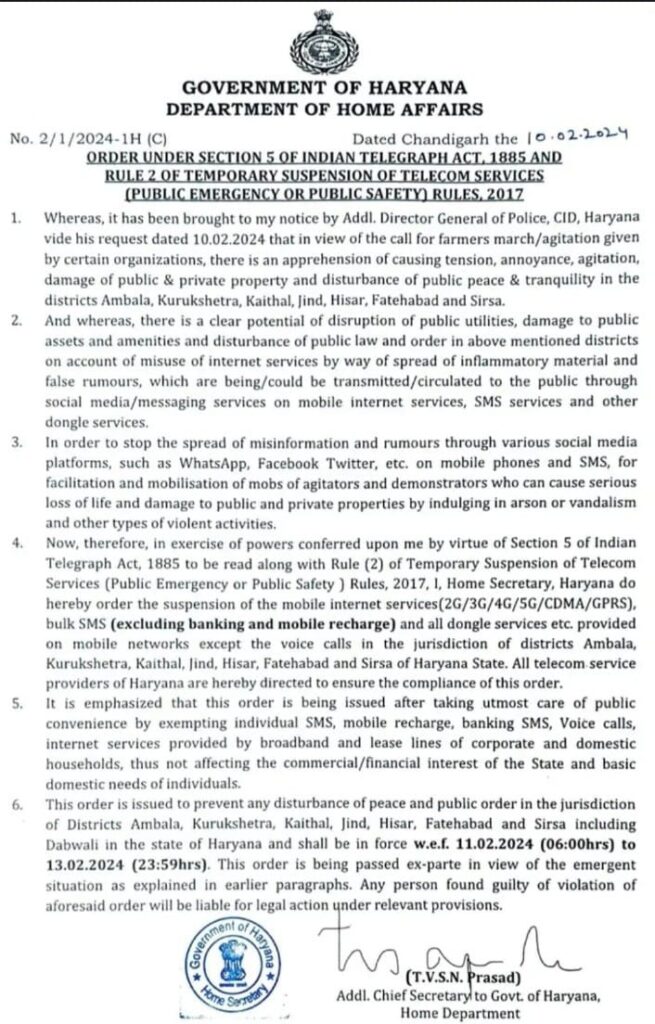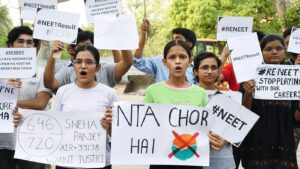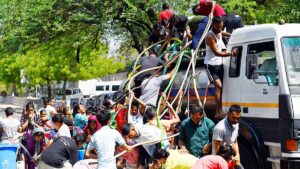The Haryana Government has Suspended Internet Services in 7 Districts of Haryana as a precautionary measure before the planned farmers’ march to Delhi on February 13. This move has impacted these districts’ mobile internet, SMS services, and dongle services. However, voice calls and broadband services continue to operate.
Internet Shutdown in 7 Districts of Haryana
Internet Services have been halted in Haryana’s Ambala, Kurukshetra, Kaithal, Jind, Hisar, Fatehabad, and Sirsa districts. The suspension, effective from 6 am to 11:59 pm on February 13, is a precautionary measure to prevent the spread of misinformation and maintain peace during the farmers’ march.
Why Haryana Government Suspended Internet Services?
On February 13, around 26 farmer unions including United Kisan Morcha and Kisan Mazdoor Morcha planned to march to Delhi with their demands.
Because of this scheduled protest march, the Haryana government has suspended internet services as a preventive step. The administration worries that misleading information can spread through social media, which may disturb public order.

The suspension order issued by the Additional Director General of Police (CID) covers the districts of Ambala, Kurukshetra, Kaithal, Jind, Hisar, Fatehabad, and Sirsa. Internet services will remain closed in these places from 6 am on February 11 to 11:59 pm on February 13.
What Triggered This Decision?
The Haryana government ordered the temporary shutdown of internet services after farmer unions announced their plans to march to Delhi on February 13. Around 10,000 farmers from Punjab are expected to enter Haryana with their tractor-trolleys and move towards Delhi. The farmer leaders have identified Shambhu border, Dabwali and Khanori border as the main entry points.
To stop the farmers’ entry, the Haryana administration has deployed police forces at these border crossing points. Barricades and barbed wires have already been installed at the Shambhu border. The Ghaggar bridge in this area has also been closed off.
How is Haryana Preparing for the Protest March?
The Haryana authorities have taken several measures to prevent Punjab farmers from entering the state on their way to Delhi:
- Section 144 imposed in Ambala, Jhajjar, Panchkula, Kaithal and other sensitive areas.
- Around 150 checkpoints were set up across the state.
- Cement barricades erected at the Shambhu border.
- Ghaggar Bridge closed near the Shambhu border.
- Heavy police deployment at all border entry points.
The restrictions have caused difficulties for regular travellers crossing state borders for their daily commute and personal needs.
What are the Farmers’ Demands?
The protesting farmers are demanding a legal guarantee for the Minimum Support Price (MSP) for their crops. They are also pressing the central government to take back the 3 contentious farm laws passed in September 2020.
So far, 11 rounds of talks have taken place between the government and the farmers’ representatives. However, the negotiations have ended in a deadlock as the farmers insist on repealing the laws.
On February 11, another meeting was held between 3 Union Ministers and farmer leaders in Chandigarh. The government assured the farmers about holding further talks, but the protest march slated for February 13 will carry on as per schedule.
What do Farmer Groups Say About the Internet Shutdown?
Kisan Mazdoor Sangharsh Committee‘s general secretary Sarwan Singh Pandher has criticized the internet ban ordered by the Haryana government. He alleged that Haryana police were raiding the houses of farmer leaders and threatening them. Pandher said the Punjab-Haryana border was being sealed like an international boundary.

Farmer unions have termed the internet shutdown an unethical move to disrupt the peaceful protests. They say that suspending telecom services will not demoralize the farmers or stop them from exercising their constitutional right to protest.
Why is the Internet Shutdown Controversial?
Shutting down internet services before a major protest or event has become a common practice for authorities in different states. However experts have highlighted various problems with such internet blackouts:
- It violates the fundamental right to freedom of speech and expression.
- Shutdowns risk public safety and cause panic in times of crisis.
- Suspensions hurt daily life, business activities and access to essential services that depend on the Internet.
- The economic costs due to lost productivity and damage to the digital economy are huge.
- The lack of internet prevents journalists from reporting freely and citizens from accessing the latest information.
- It disproportionately affects the poor who rely on mobile internet for their livelihoods.
- Shutdowns do not really curb unrest or stop the spread of misinformation on the ground.
How Have States Reacted to the Farmers’ Protests?
Several non-BJP ruled states have extended their support to the farmers’ movement against the central farm laws:
- Punjab passed laws to negate the central acts and passed resolutions against the farm laws.
- Delhi government also passed a resolution against the laws and provided humanitarian aid to protesting farmers.
- Rajasthan amended APMC laws to protect MSP and registration of traders.
- Chhattisgarh has refused to implement the Central Farm Act.
- The Kerala government announced it will approach the Supreme Court against the farm laws.
- Non-BJP states like Maharashtra, Jharkhand, and Odisha have voiced concerns over the MSP guarantee and talked about not implementing the acts.
How Have Opposition Parties Reacted to the Farmers’ Protests?
The opposition has strongly criticized the government’s handling of the ongoing farmers’ agitation:
- Congress party has extended support to the protests and demanded repeal of the farm laws. Rahul Gandhi has been vocal in backing the farmers’ issues.
- Aam Aadmi Party has also backed the protests in Delhi and Punjab where it is in power. Delhi CM Arvind Kejriwal fasted in solidarity with farmers.
- Samajwadi Party chief Akhilesh Yadav blamed the BJP for disrespecting farmers and called for withdrawal of the laws.
- Trinamool Congress chief Mamata Banerjee announced solidarity with the farmers’ movement and vowed to never implement the “anti-people” laws in West Bengal.
- CPI(M) and CPI have accused the Modi government of crony capitalism and criticized the farm laws as pro-corporate.
- BSP chief Mayawati urged the Centre to hold talks with farmers with an open heart and abandoning its stubborn stand.
- Farmer leader Rakesh Tikait has appealed for opposition unity to intensify protests against the agri laws across the country.
What are the Concerns Around MSP Guarantee?
Though the laws don’t abolish MSP, the farmers want it made mandatory for all buyers. The key issues around this demand are:
- MSP declares minimum rates but doesn’t guarantee procurement. With alternative channels, farmers fear private players won’t offer MSP.
- Only 30% of farmers actually benefit from MSP procurement for rice and wheat. Expanding this to more crops will strain fiscal resources.
- Insisting on MSP across all commodities may prove counterproductive, affecting crop diversification.
- Legally mandating MSP will risk distortion of market forces and disincentivize crop competitiveness.
- More important than MSP itself is ensuring productive investment, market linkage and risk mitigation for farmers.
The solution lies in focusing on strategic procurement along with building farmer capacities for aggregating produce and negotiating better prices.
How Can the Impasse Between Government & Farmers Be Resolved?
The protesting farmers have reiterated that their call for repealing the 3 contentious laws and legalizing MSP remains unchanged. The government is also firm on not repealing the agricultural reforms.
To break this deadlock, here are some possible solutions that experts have proposed:
- Keeping the reforms on hold for 2 years and setting up a joint committee to thoroughly consult all stakeholders.
- Amending the laws to include MSP guarantee as demanded by farmers.
- Inserting provisions that safeguard farmers from corporates and prevent exploitation.
- Strengthening the existing agricultural produce market committees instead of weakening them.
- Providing direct income support to farmers over and above MSP to make farming viable.
A peaceful resolution requires both sides to make compromises without losing face or political capital. But the government’s unilateral decision to suspend internet services hints at an intention to suppress dissent by force rather than engaging in dialogue. This excessive curb on civil liberties will only aggravate tensions with the protesting farmers.










